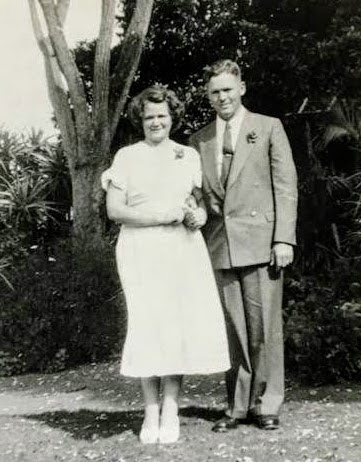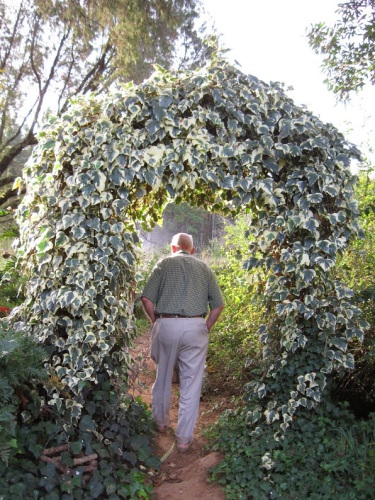My father died last year only three months prior to his 90th birthday. His last years in a retirement village in South Africa were spent in quiet solitude reading and reminiscing on the lessons of a long life lived.
Especially during my teenage years, we had a difficult relationship. I perceived him as weak with our mother making all the decisions pertaining to important family and other matters. It was embarrassing when he would at times interrupt a conversation with a completely unrelated topic.
I could not understand why he was the complete opposite to his five opinionated and charismatic younger brothers who each in their way had been very successful. They ran profitable businesses, and farms and the youngest was the headmaster of a school.
The veil of silence
It seemed as if my father lived a life separate from the world around him behind a thick veil of silence. Unsurprisingly my two brothers and I tried numerous methods, especially provocation to break through that veil. In his frustration, he would try to discipline us by referring to the all-powerful family figurehead. “What do you think grandfather would say?” That worked. We did not want to get in grandpa’s bad books.
We spent most of our school vacations and weekends on the grandparent’s farm. Some of those happiest childhood memories were the swims in the crystal clear waters of the Pongola River in rural South Africa, milking cows by hand, listening to the stories of the Zulus around a fireplace, and riding through the African veld on horseback.
A family secret revealed
Only much later in life my uncle and godfather, his life slowly ebbing away from cancer, took me aside with the words: “I think you need to know a few things about your father to understand why he is the way he is.”
The family secret was finally revealed. I was a toddler when my father had, what they called at the time “a nervous breakdown.” My father had been unable to fulfill my grandfather’s high expectations. I can only imagine what the next weeks in a mental institution must have been like. Treatment of mental illness with controversial electroshock or electroconvulsive therapy was common in the early 1960s. From what my uncle confided to me that day a once proud, handsome man was reduced to a shadow of his former self. At that time the therapy was only known to me from the movie “One flew over the Cuckoo’s Nest” starring Jack Nicholson.
It took years of family constellation work for me to only begin to understand the deeper underlying structure of the “absent father syndrome”. My great-grandfather died when my grandfather could barely walk. Lacking a real father role model he projected many of his own insecurities onto my father, confusing authority with authoritarian control.
Absent father syndrome
Families in countries devastated from the effects of the terrible 20th-century wars were affected for generations by the “absent father syndrome”. Those fathers who survived the war seldom if ever spoke about their trauma, leaving sons and daughters grappling with traumatized men unable to fully engage as fathers and role models. Mothers more often than not were overburdened with the task of emotionally handling the affairs of the family while the father was reduced to the role of the “breadwinner”.
Many a single mother knows all about absent fathers unable or unwilling to fully participate because of the chronic lack of role models. There is an African saying that it “takes a village to raise a child”. Mothers, aunts, grandmothers, fathers, uncles, grandfathers, and godfathers were all part of elaborate initiation rituals during the important stages of life.
It is impossible to return to that world where village life remained largely intact, and few villagers left their familiar surroundings but the importance of ritual and the definitive roles of the father and the mother in these rituals appears to be a key factor in determining a child’s mental and physical health.
Reframing the father figure
Especially during the difficult phase of puberty where the child is grappling with finding its own identity separate from that of the parent. Society needs to reframe the role of the father and the father needs to explore role models beyond the dysfunctional family unit. Expression of vulnerability is not a sign of weakness but of strength and creates real space for intimate relationships. Humility is a powerful antidote to a false image of pride.
Jesus is quoted as saying in John 14:10: “Believest thou not that I am in the Father, and the Father in me? the words that I speak unto you I speak not of myself: but the Father that dwelleth in me, he doeth the works.”
The power within is that which opens the way to a new beginning from the path of pain. It is that innate feeling of trust that all has meaning and purpose in the greater cycle of things.
Today I can look at pride in what my father accomplished. He remained a humble man with a stoic steadfastness during several family tragedies, earning quiet respect from several people who had ridiculed and looked down on him in his younger years.
During our last conversations, he was simply grateful for the grace of a long life lived. I would not have been what I am today without him. Despite his reservations, he allowed his sons to make their own choices and to live lives on their own terms free of judgment and parental control. I will forever be grateful for that.



